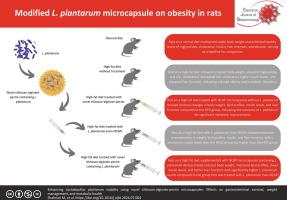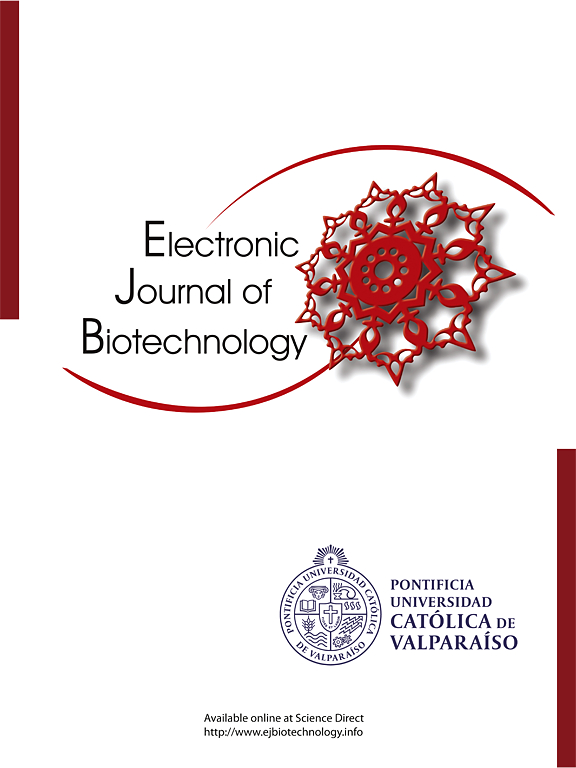利用新型壳聚糖-精氨酸-pectin 微胶囊提高植物乳杆菌的活力:对胃肠道存活、体重管理和代谢健康的影响
IF 2.5
4区 生物学
Q3 BIOTECHNOLOGY & APPLIED MICROBIOLOGY
引用次数: 0
摘要
背景植物乳杆菌等益生菌有望控制肥胖症,但输送方面的挑战阻碍了它们的有效性。本研究探讨了含有植物乳杆菌的 NCAP 微胶囊在八周内对大鼠体重、血脂、肝功能和胰岛素的影响,通过微胶囊化提高了细菌的存活率。在大鼠体内,含有 NCAP 微胶囊的高脂饮食(HFDC)显著降低了体重(176 克 vs 179 克,p < 0.001)、低密度脂蛋白(33 毫克/分升 vs 44 毫克/分升,p < 0.001),并改善了肝脏指标(天冬氨酸转氨酶 56 U/L vs 69 U/L, p = 0.008;丙氨酸转氨酶 36 U/L vs 38 U/L, p < 0.001)。结论NCAP 微胶囊可提高植物乳杆菌的存活率,改善体重、血脂、肝功能和胰岛素。这项研究满足了人们对有效益生菌输送系统的需求,为促进代谢健康提供了启示:Shahriari M, Mohabati Mobarez A, Talebi Bazminabadi A, et al:对胃肠道存活、体重管理和代谢健康的影响。Electron J Biotechnol 2024;72. https://doi.org/10.1016/j.ejbt.2024.07.004.本文章由计算机程序翻译,如有差异,请以英文原文为准。

Enhancing Lactobacillus plantarum viability using novel chitosan-alginate-pectin microcapsules: Effects on gastrointestinal survival, weight management, and metabolic health
Background
Probiotics, like Lactobacillus plantarum, show promise in managing obesity, but delivery challenges hinder their effectiveness. This study explores the effects of NCAP microcapsules with L. plantarum on weight, lipids, liver function, and insulin in rats over eight weeks, enhancing the bacteria’s survivability through microencapsulation.
Results
NCAP microcapsules (10–15 μm, >79% survival) effectively protected L. plantarum. In rats, a high-fat diet with NCAP microcapsules (HFDC) significantly reduced body weight (176 g vs 179 g, p < 0.001), low-density lipoprotein (33 mg/dL vs 44 mg/dL, p < 0.001), and improved liver markers (aspartate transaminase 56 U/L vs 69 U/L, p = 0.008; alanine transaminase 36 U/L vs 38 U/L, p < 0.001). L. plantarum counts were notably higher in HFDC (870,963,590 CFU/g vs 14,454 CFU/g, p < 0.001).
Conclusions
NCAP microcapsules enhance L. plantarum survivability and improve weight, lipids, liver function, and insulin. This study addresses the need for effective probiotic delivery systems, offering insights into metabolic health promotion.
How to cite: Shahriari M, Mohabati Mobarez A, Talebi Bazminabadi A, et al. Enhancing Lactobacillus plantarum viability using novel chitosan-alginate-pectin microcapsules: Effects on gastrointestinal survival, weight management, and metabolic health. Electron J Biotechnol 2024;72. https://doi.org/10.1016/j.ejbt.2024.07.004.
求助全文
通过发布文献求助,成功后即可免费获取论文全文。
去求助
来源期刊

Electronic Journal of Biotechnology
工程技术-生物工程与应用微生物
CiteScore
5.60
自引率
0.00%
发文量
50
审稿时长
2 months
期刊介绍:
Electronic Journal of Biotechnology is an international scientific electronic journal, which publishes papers from all areas related to Biotechnology. It covers from molecular biology and the chemistry of biological processes to aquatic and earth environmental aspects, computational applications, policy and ethical issues directly related to Biotechnology.
The journal provides an effective way to publish research and review articles and short communications, video material, animation sequences and 3D are also accepted to support and enhance articles. The articles will be examined by a scientific committee and anonymous evaluators and published every two months in HTML and PDF formats (January 15th , March 15th, May 15th, July 15th, September 15th, November 15th).
The following areas are covered in the Journal:
• Animal Biotechnology
• Biofilms
• Bioinformatics
• Biomedicine
• Biopolicies of International Cooperation
• Biosafety
• Biotechnology Industry
• Biotechnology of Human Disorders
• Chemical Engineering
• Environmental Biotechnology
• Food Biotechnology
• Marine Biotechnology
• Microbial Biotechnology
• Molecular Biology and Genetics
•Nanobiotechnology
• Omics
• Plant Biotechnology
• Process Biotechnology
• Process Chemistry and Technology
• Tissue Engineering
 求助内容:
求助内容: 应助结果提醒方式:
应助结果提醒方式:


